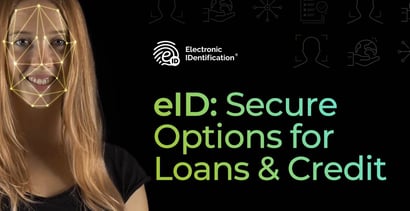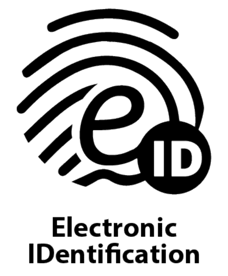

In a Nutshell: Now more than ever, maintaining high levels of security when facilitating loans or issuing credit is extremely important for financial institutions. Electronic IDentification helps banks and an array of other types of businesses protect against identity theft and other fraud. The company’s comprehensive range of virtual identification verification services, including VideoID, SmileID, and SignatureID use the highest levels of security to guard client data. Companies using Electronic IDentification can rest easy knowing they can safely identify users, and that users are guarded against fraud when securing loans or accessing other services.
Long gone are the days when a simple four-digit passcode was sufficient to protect important information on the internet.
Unfortunately, identity theft and other types of fraud continue to be very real threats in today’s world. And just as advances continue in the fintech realm, so too do advances in fraud techniques.
 That means that banks and other financial institutions must be diligent when it comes to protecting all parties involved in money transactions, including loans, credit cards, and other financial affairs.
That means that banks and other financial institutions must be diligent when it comes to protecting all parties involved in money transactions, including loans, credit cards, and other financial affairs.
Electronic IDentification, better known as Electronic ID, is doing its part to keep people and businesses safe with its suite of innovative remote user identification systems.
We recently spoke with Francisco Martos Moreno, eID’s Regional Account Manager in Spain, about the company’s products and technology, as well as how it can make securing loans and other financial transactions safer.
“Electronic IDentification was founded in 2013, and it was actually created for an Open Democracy project. So it was a bit different than it is today,” Moreno said. “But (the founders) realized this technology had big potential.”
Moreno said the company made some internal tweaks and began approaching the financial sector with its innovative identification products in 2016.
“eID operates within five continents, being a game changer in relation to the experience of customers in industries which require a high level of security in eID and contracting,” according to the eID website.
Solutions Include VideoID, SmileID, and SignatureID
Moreno said Electronic IDentification offers a wide range of identification solutions to suit many different use cases and regulations in different countries. The company’s three main products for fast, secure identification are VideoID, SmileID, and SignatureID.
All of these offerings center around what’s known as KYC (Know Your Customer) and AML (Anti-Money Laundering) regulations in the industry. Basically, these regulations help to add another layer (or layers) of security to prevent identity theft, money laundering — for example, from terrorist organizations — and other forms of fraud.

Francisco Martos Moreno is Electronic ID’s Regional Account Manager in Spain.
“What makes Electronic IDentification unique in the market is our VideoID, which is actually based on video streaming,” Moreno said. “We perform the whole process of identification on video streaming. The user launches the video and shows both sides of the document and then their face.”
Moreno said the company performs security checks on the documents and tracks all of the data via optical media recognition.
“Then we compare the face of the person with a picture that they appear in, as well as performing a license detection at the end,” he said. “So we do a lot. Basically all of the necessary requirements in one single process. The user experience is quite good.”
Next, SmileID is a face biometrics solution in which identity is verified remotely and is compliant with KYC and AML regulations.
“SmileID’s unique UX works on any channel from a mobile, desktop, or even a branch office,” according to Electronic ID.
Finally, the company calls its SignatureID service the definitive esignature.
“Unique in the market. All in one click: simple, advance, qualified,” according to the eID website. “Our Digital Signature adapts to the level of risk and legal requirements of your business operations. SignatureID adapts by simple configuration to every single contracting case.”
How the Platform Benefits the Financial Sector
About 90% of the banks that use Electronic IDentification prefer the VideoID service, according to the company website.
“Equivalent to face-to-face identification, video streaming technology has become the standard for high-security ID verification processes,” according to Electronic ID. “Forty-one countries have already introduced regulations allowing customer onboarding through video streaming technology.”
The company’s AI algorithm can onboard a new customer in less than 30 seconds, increase conversion rates, and avoid fraud in real time.
It makes sense that most of Electronic ID’s client banks prefer VideoID since those are all attributes that the financial sector finds appealing.
“A high level of security is necessary to open a bank account, so every company within the banking industry normally uses this kind of technology,” Moreno said. “And, in the case for small loans, it’s possible to perform it all with an automatic experience without any human intervention, which is very substantial.”
Moreno said that, from a user perspective, the process is very simple and straightforward.
“The user clicks on opening a bank account, for example, and they will have to read some terms and conditions,” he said. “First of all, they will give permission to the camera and to the microphone so they can be recorded within the process.”
One of the use cases for eID currently employed by the finance industry is the account opening process and face biometrics registration in an ATM.
“Biometerical comparison and liveness check with more than 21 security measures in real time through a 30-second video,” according to the company. “Video is asynchronously sent to the back-office for validation by a certified agent. The face biometric pattern can be registered for authentication purposes. This solution provides an omnichannel experience.”
Security is a Top Priority
Obviously, all of Electronic ID’s services function within the realm of cybersecurity, and the company is truly committed to maintaining the highest standards of security for its clients and their customers.
“From eID we offer KYC (Know Your Customer) solutions and services that help our customers to provide a unique, simple, frictionless, high-security experience that meets the highest standards required in international regulations,” according to the company.
Regulations are shifting to permit these new kinds of technology to remodel the market allowing customer acquisition processes — like opening a bank account — to be completed in seconds online rather than in weeks with total security and compliance, according to Electronic ID.
“Our Video IDentification, Advanced and Qualified Electronic Signature, and Facial Biometric Authentication services are transforming the way in which companies and customers interact,” according to the website.

eID’s innovative technology promotes security within the financial sector.
The company aims to remain the leading global provider of remote identification systems. That’s why Electronic IDentification invests extensively in the legal field and is a pioneer in validating and certifying its solutions with the most demanding legislations, including AML, eIDAS, GDPR or PSD2, among others.
“Current eKYC solutions, powered by Artificial Intelligence and Machine Learning, allow businesses in any sector, such as banking, insurance, financial and investment services, to be digitally transformed, reduce digital customer onboarding costs and grow by offering a unique user experience,” according to Electronic ID.
The company maintains best practices and meets or exceeds standards and regulations necessary in Europe and several other regions of the world.
Its VideoID service, which is particularly popular among banks, “complies with the provisions of the AML / KYC / CDD procedures in local authorizations in multiple countries such as the U.S., Mexico, Colombia, Chile, Peru, Hong Kong, Japan, Singapore, South Korea, among others,” according to the company.
Advertiser Disclosure
BadCredit.org is a free online resource that offers valuable content and comparison services to users. To keep this resource 100% free for users, we receive advertising compensation from the financial products listed on this page. Along with key review factors, this compensation may impact how and where products appear on the page (including, for example, the order in which they appear). BadCredit.org does not include listings for all financial products.
Our Editorial Review Policy
Our site is committed to publishing independent, accurate content guided by strict editorial guidelines. Before articles and reviews are published on our site, they undergo a thorough review process performed by a team of independent editors and subject-matter experts to ensure the content’s accuracy, timeliness, and impartiality. Our editorial team is separate and independent of our site’s advertisers, and the opinions they express on our site are their own. To read more about our team members and their editorial backgrounds, please visit our site’s About page.




